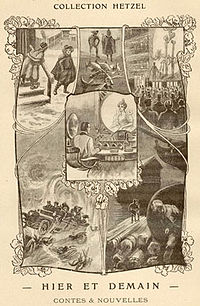Yesterday and Tomorrow (French: Hier et Demain) is a posthumous collection of short stories by Jules Verne, first published in 1910 by Louis-Jules Hetzel.
 | |
| Author | Jules Verne |
|---|---|
| Original title | Hier et Demain |
| Language | French |
| Series | Voyages Extraordinaires |
| Genre | Short stories |
| Publisher | Pierre-Jules Hetzel |
Publication date | 1910 |
| Publication place | France |
Published in English | 1965 |
| Media type | |
The stories in the original French edition were edited and/or modified by the author's son, Michel Verne[1].
Contents
editThe stories in the original French edition (Hier et Demain) include:
- La Famille Raton (The Rat family)
- M. Ré-Dièze et Mlle Mi-Bémol (Mr Ray Sharp and Miss Me Flatt)
- La Destinée de Jean Morénas (The Sombre Fate of Jean Morenas)
- Le Humbug (The Humbug)
- Au XXIXe siècle : La Journée d'un journaliste américain en 2889 (In the Twentieth Century: the Day of an American Journalist in 2889)
- L'Éternel Adam (The Eternal Adam)
In the English editions of this book (Yesterday and Tomorrow), a different set of titles are present[2]:
- The Eternal Adam
- The Fate of Jean Morenas
- An Ideal City (added)
- Ten Hours Hunting (added)
- Frritt-Flacc (added)
- Gil Braltar (added)
- In the Twentieth Century: the Day of an American Journalist in 2889
- Mr. Ray Sharp and Miss Me Flat
In the introduction to the English edition, editor I. O. Evans comments on the decision not to include Le Humbug and La Famille Raton[3]:
"... That volume (Hier et Demain) forms the basis of the present collection of short stories and oddments, hitherto, so far as I can ascertain, unpublished in Britain. Two stories included in the original volume have, however, been omitted as lacking in general interest, and have been replaced by others culled from various sources.
One of the omissions, La Famille Raton (this could perhaps best be translated as "Mr Rat and his Family") seems to be a fairy-story, but it is so absurdly fantastic that one cannot be certain whether Verne meant it "seriously" as an entertainment for children or simply as a burlesque for the amusement of sardonic adults: it appeared in the figaro illustre for January 1891.
The title of the other, Le Humbug, needs no translation: this is a fierce satire on a type of character whom the author disliked intensely, the boastful mendacious American "go getter"; its hero is a caricature of a super-Barnum."
References
edit- ^ Dehs, Volker; Margot, Jean-Michel; Har’El, Zvi. "The Complete Jules Verne Bibliography". Zvi Har’El’s Jules Verne Collection.
- ^ "Yesterday and Tomorrow". julesverne.ca.
- ^ Evans, Idrisyn Oliver (1965). Yesterday and Tomorrow. Introduction. ARCO Publications.